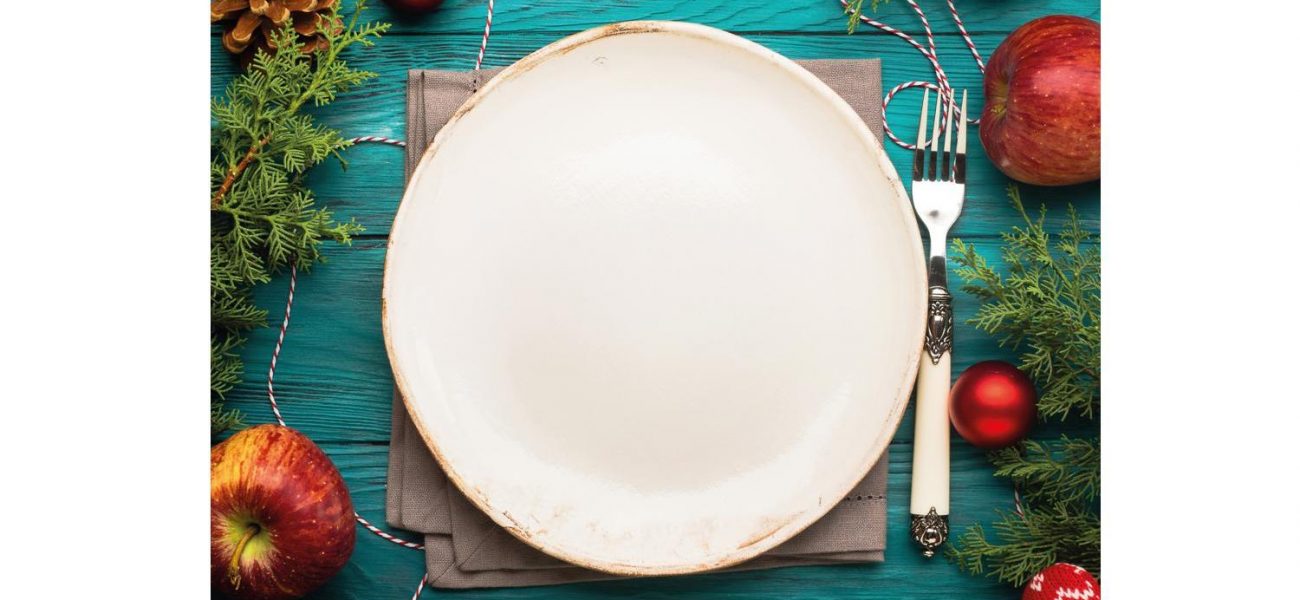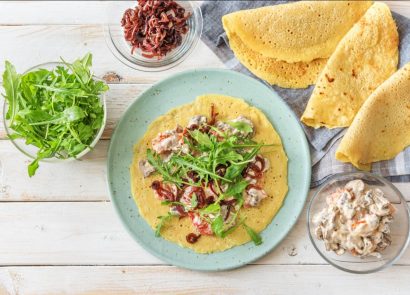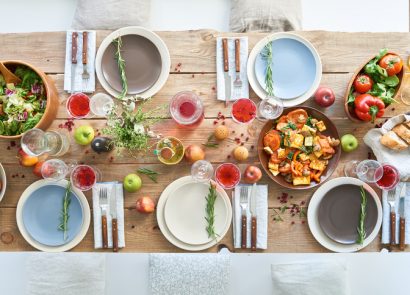[jwplayer bWtP4sag]From delicious healthy recipes to the best nutritional advice, we guide you through what should – and shouldn’t – be on your plate this month
The turkey’s in the oven, there’s a bottle of bubbly chilling in the fridge and the box of Quality Street won’t stop staring at you from the coffee table. ‘Tis truly the season for indulgence, but for a time of year that’s supposed to be merry and bright, it can actually leave you feeling sluggish and languid. Plus, let’s be honest. How many times have you used the excuse of ‘it’s Christmas’ to stock up on mince pies like they’re going out of fashion? Rather than abandoning your hard work and starting again in January, we’ve got some easy solutions to a satisfying, yet mindful Christmas.
Don’t start too early
Christmas seems to last longer every year. Adverts start appearing on TV months before the big day and, with supermarket shelves filling up on your festive favourites, it can be tempting to follow suit. But going gung-ho on the pigs in blankets too soon can lead to starting the new year feeling lethargic and dreading the feeling of having to lose a few pounds, says Rob Hobson, head of nutrition at Healthspan (healthspan.co.uk). “There’s nothing wrong with enjoying yourself, but the all-or-nothing mentality has the potential to last the whole of December. The key is pacing yourself. Having a little more wine than usual, indulging in a bowl of Christmas pudding with cream and enjoying sweet treats over a James Bond movie is all part of achieving balance, so it’s important to enjoy these moments and just get back to eating normally after the festivities.” You really can have your Christmas cake and eat it, too.
Jenna Hope, registered nutrition consultant (jennahopenutrition.com), advises welcoming all foods in your diet during the festive period. “When foods are off limits, naturally as humans, we want them more! It’s important to ensure that fruits, vegetables and regular healthy eating patterns don’t get thrown to one side, though. By incorporating the Christmas delicacies into a healthy balanced diet, you can reduce the overeating.” Everything in moderation, as the old saying goes.
Know your limits
Office parties and after-work drinks may be few and far between this year, but it’s still helpful to be aware of how many units is recommended if you enjoy a tipple at home. According to the NHS, men and women are advised not to drink more than 14 units in a week, and a small glass of wine is 1.5 of those, FYI. “Try to spread your alcohol consumption over a few days,” says Dr Sally Norton, NHS consultant and weight-loss expert (vavista.com). “It will also help to drink your wine slowly. That means someone is less likely to top it up and the less you’ll drink as a result.” Staying hydrated throughout the night and alternating your alcohol with glasses of water will also help to moderate your intake. Plus, it means staying sober enough to keep you from switching your Zoom from video to just audio the next day. You can thank us later.
Stock up on healthy swaps
Don’t get us wrong, rainbow schmainbow when it comes to Christmas dinner, right? Building a balanced plate without the temptation of roast potatoes, stuffing and traditional turkey is like a walk in the park other times of the year, which means the potential to pile our dishes high. “Choosing a chocolate with a higher percentage of cocoa, such as 70 percent or higher and eating nuts that are unsalted can help us to make informed choices,” recommends Jasmin Carbon, registered dietitian (carbonnutrition.co.uk). “You could also try eating from a smaller plate, that way you can keep your portions in check.” Oh, and if you’re living the real-life episode of The Vicar of Dibley, Jasmine says to try a veggie option, rather than choosing meat every time if you’ve been invited to multiple Christmas dinners (with groups of less than six, mind). Dr Sally also points to the food that has many health benefits and can make for nutritious sides to our main centrepiece. “Potatoes are a good source of potassium and starchy carbohydrate. However, they’re best boiled in their skins, as that’s where all the fibre is. Parsnips are another great source of fibre, potassium and vitamin C. The cooking methods are where things can go awry, though, so be mindful about adding honey or Parmesan. Cranberries also contain lots of vitamin C, but go easy on the sauce which may have a high sugar content.”
Food for pleasure
Demonising Christmas food can be a slippery slope – scouring the shelves for low-fat or reduced-calorie options may make you think you’re being the conscious consumer, but many of those products can contain added salt and sugar, warns Jasmine. “These foods can also be less satisfying and the nonauthentic taste can actually cause you to eat more. My advice would be to read the food label. The British Heart Foundation (bhf.org.uk) has some great online material, explaining how to read and understand food labels so that you can make an informed choice.” Categorising food into good and bad is often what leads to guilt too, says Rob, with foods high in sugar, fat and salt leaving us feeling low. Rather than assigning days to indulge, he suggests incorporating those festive foods into your already healthy eating. “Rather than piling your pudding with lashings of cream and wolfing it down, try taking your time to enjoy every sensation, which includes the way these foods taste and smell.
Christmas holds many happy memories, which span back to childhood, so by loading up with nuts, dried fruit and seasonal veg, you can boost your nutritional intake and enjoy the festivities of this time of year.” And the question of moderation? Jenna says you’ve got plenty of time to feel positive about your food choices. “It can be helpful to remind yourself that the Christmas season lasts a long period of time and not everything has to be consumed on the same day. Therefore, constantly remembering that there’s always tomorrow to enjoy an extra cookie or mince pie to help prevent you going overboard.
Christmas crackers
“There’s no getting away from these foods at Christmas, and while you may think they could sabotage your efforts to make healthy choices, they actually come with surprising benefits,” says Sian Porter, consultant dietitian for California Walnuts (walnuts.org).
Nuts
Nuts are a great high-protein snack. Walnuts, for example, contain 4.4g of protein in a 30g serving and uniquely contain significant amounts of the plantbased essential omega 3 that our bodies need, but can only get from food.
Dried fruit
This is much smaller than fresh, so it’s easy to overeat. Stick to a handful or a tablespoon for one portion. Three dried apricots are rich in beta-carotene, important for maintaining normal vision.
Party nibbles
My advice would be to swap crisps for veg dipping sticks and cheese straws for bread sticks, helping to boost fibre and veg intake.
Stuffing
Everyone has their own recipe for stuffing, but swapping some of the sausage meat for wholemeal breadcrumbs, chopped nuts and dried fruit can increase fibre and iron to help reduce tiredness and fatigue.
Potatoes
Potatoes are a source of potassium, which helps to look after your blood pressure. When making mash, use a colourful mixture of potatoes, swede, parsnips and carrots to boost fibre, vitamin C and vitamin A – both of which can support healthy skin.
Gravy
Rather than throwing away the water vegetables have been cooked in, use it for gravy and potentially benefit from the vitamin C and folate in the water, which both help maintain immune function.




















